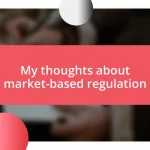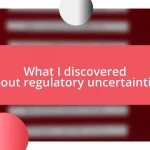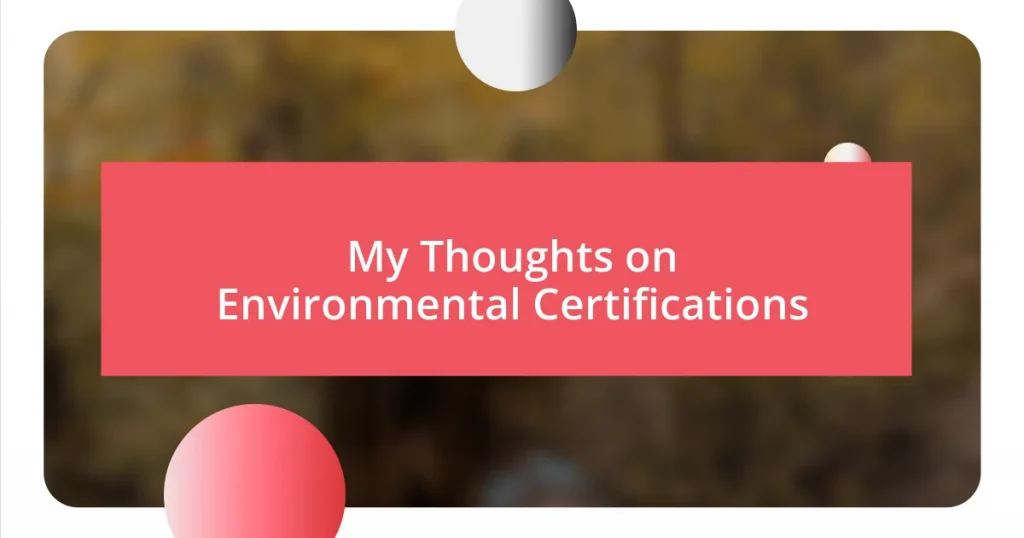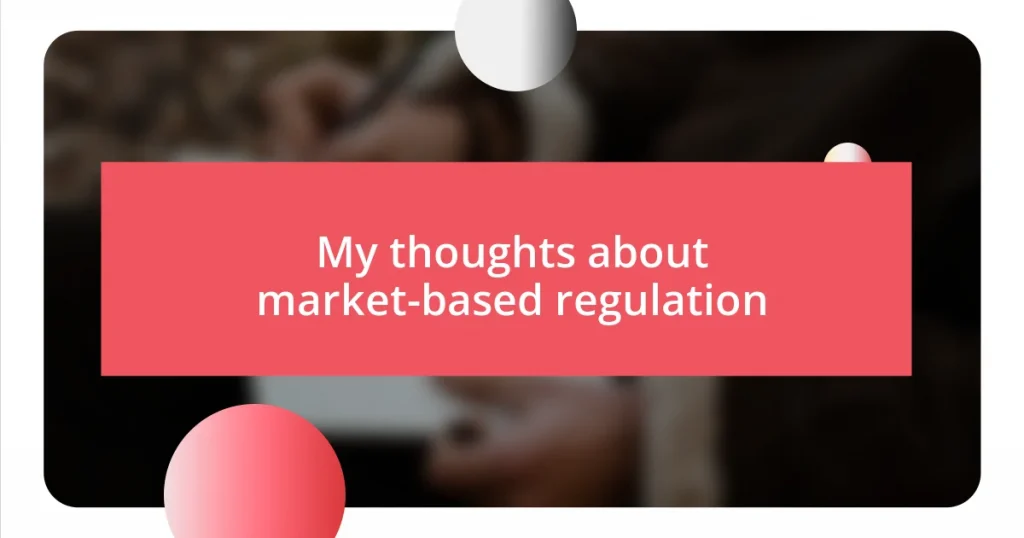Key takeaways:
- Environmental certifications build consumer trust and encourage sustainable practices among businesses, creating a win-win scenario.
- Challenges such as bureaucratic complexity, costs, and inconsistent standards hinder the certification process for many companies.
- The future of certifications may include digital verification, integration of social responsibility, and collaborative efforts among multiple stakeholders for a more unified approach.
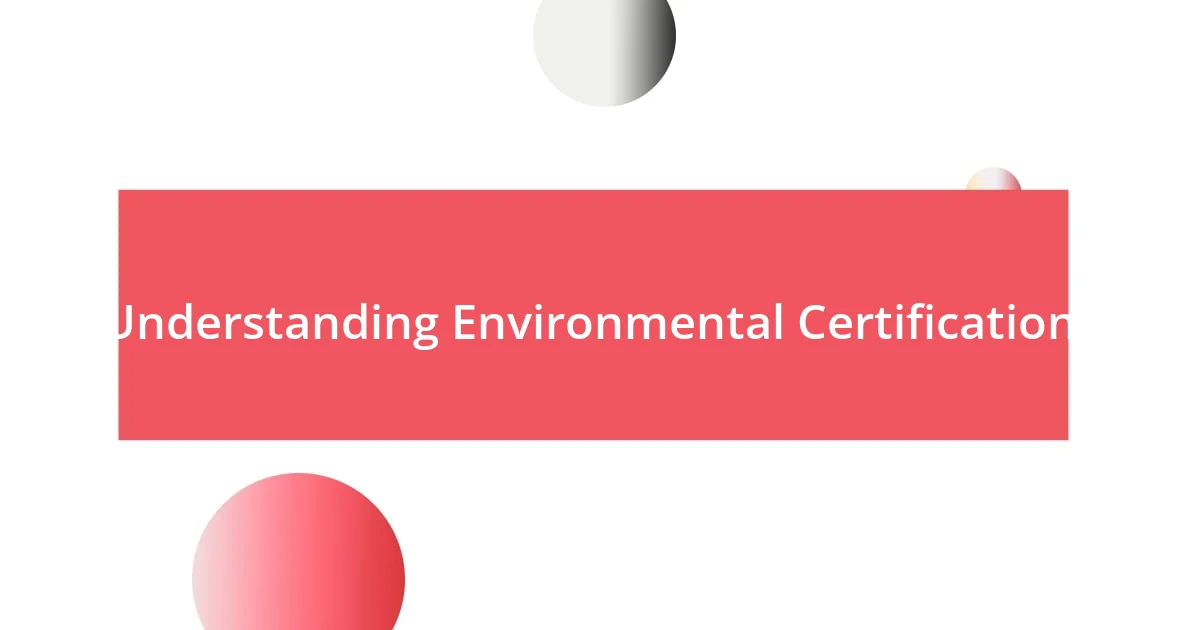
Understanding Environmental Certifications
When I first learned about environmental certifications, I was genuinely intrigued. They act as a badge of honor for companies that prioritize sustainability and environmental responsibility. Have you ever stopped to think about how much choice we have as consumers? Those logos on packaging can guide us toward more eco-friendly options, empowering us to make a difference with our purchases.
The variety of certifications can be overwhelming, though. For instance, I remember trying to decipher the difference between Energy Star and Green Seal while shopping for appliances. Each certification has its criteria, which are designed to assure consumers that the products are energy-efficient or made from sustainable materials. It can feel like navigating a maze at times, making me curious about how well we truly understand what each label signifies.
What strikes me the most is how these certifications not only signal a product’s green credentials but also foster transparency in industries that can be pretty opaque. I’ve often wondered: when did we start holding brands accountable for their environmental impact? This shift has been remarkable, showing that consumers are now, more than ever, taking a stand for a healthier planet.
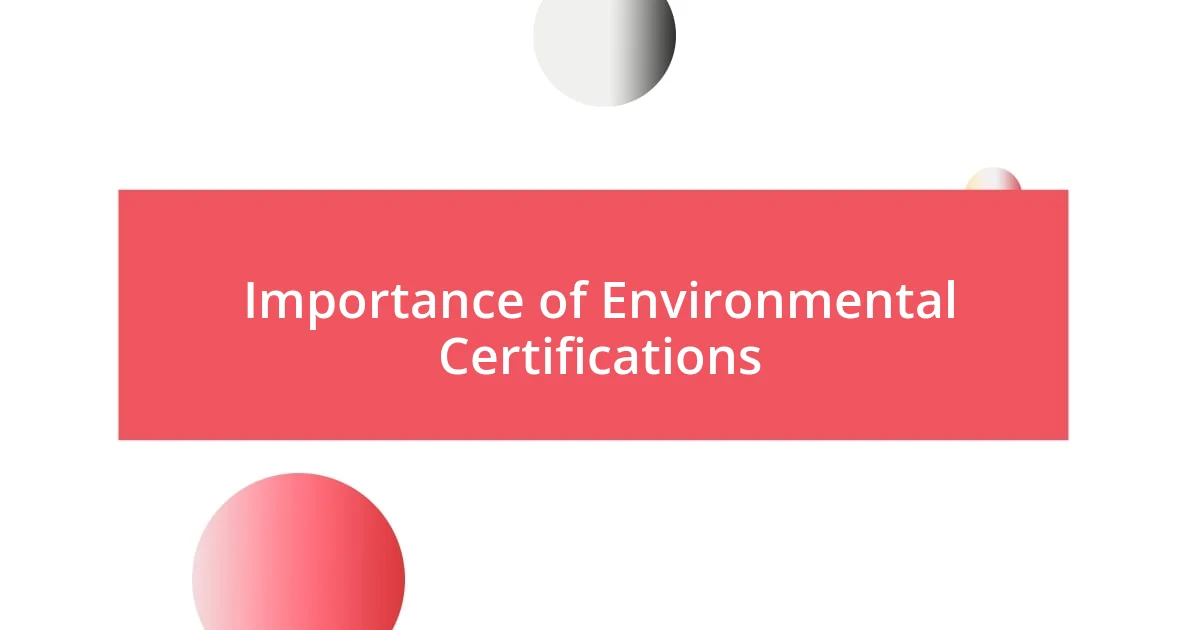
Importance of Environmental Certifications
Understanding the importance of environmental certifications is essential for both consumers and businesses. From my experience, these certifications serve as essential benchmarks for assessing a product’s environmental impact. They provide clarity in a world where greenwashing can easily mislead consumers, allowing us to make informed choices.
- Environmental certifications help build trust between brands and consumers, ensuring that companies are committed to sustainable practices.
- They promote industry-wide standards, pushing organizations to adopt environmentally friendly practices to remain competitive.
- Certifications can significantly influence purchasing decisions, encouraging businesses to prioritize sustainability to meet consumer demand.
- Being certified can enhance a company’s reputation, making it more appealing to both customers and potential investors.
Reflecting on my journey, I once chose a brand solely based on its certification label. The feeling of supporting an eco-conscious company was empowering. It’s more than just a purchase; it’s a statement of values. These choices have a rippling effect, inspiring others to consider their environmental impact, too.
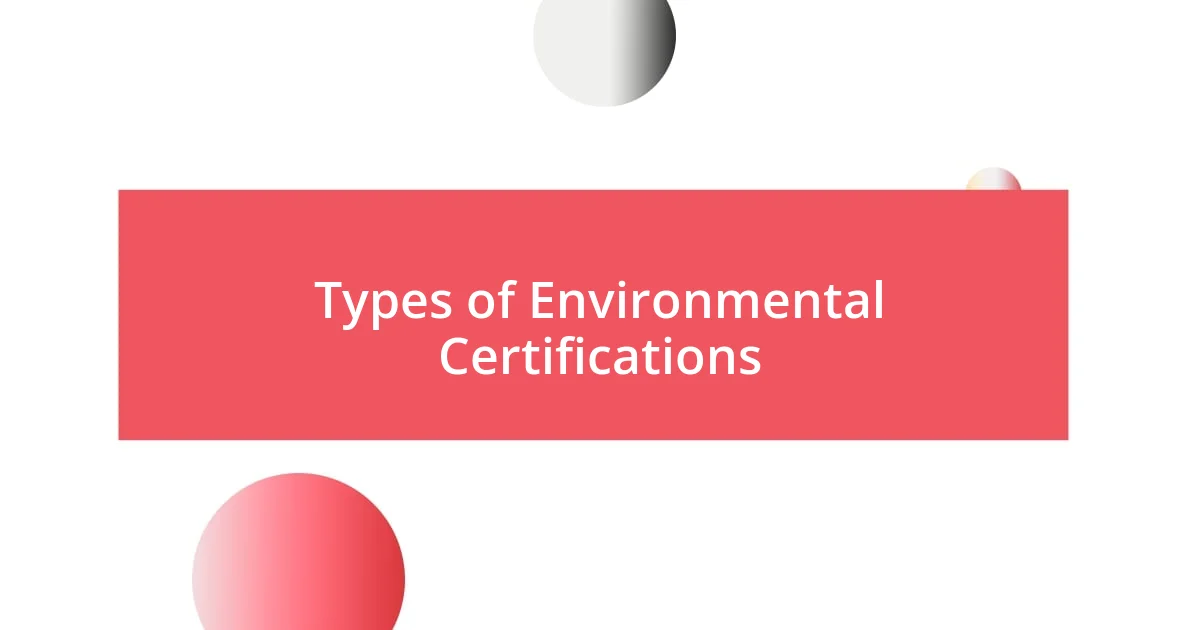
Types of Environmental Certifications
Environmental certifications come in various forms, and each serves a distinct purpose. For example, I’ve found certifications like Fair Trade particularly compelling. They not only endorse environmental sustainability but also support fair labor practices, allowing me to feel better about the choices I make with my purchases. It’s remarkable how some labels resonate with our personal values, creating a more profound connection to the products we consume.
I often come across certifications focused on specific sectors, like LEED for building projects or USDA Organic for food products. What I appreciate about these is their clarity; they each have defined standards that guide what qualifies a product for certification. This segmentation helps me quickly identify which products align best with my eco-conscious lifestyle, making shopping less of a chore and more of an intentional experience.
As I navigate through these various certifications, I can’t help but reflect on how crucial they are in today’s market. It excites me to see more companies pursuing certifications like B Corp, which not only evaluates environmental impact but also social responsibility. It makes me feel like I’m part of a bigger movement, supporting businesses that prioritize positive change. Thinking about the future, I wonder what new certifications might emerge to further enhance transparency and accountability in our consumer choices.
| Type of Certification | Description |
|---|---|
| Fair Trade | Promotes sustainable practices and fair wages for producers, often seen on food and craft products. |
| LEED | A standard for green building design, ensuring energy efficiency, sustainable materials, and lower environmental impact. |
| USDA Organic | Signifies that food products meet specific agricultural standards, emphasizing no synthetic pesticides or fertilizers. |
| B Corp | A certification for businesses meeting rigorous social and environmental performance standards, promoting sustainability. |

Benefits for Businesses and Consumers
When I think about the benefits environmental certifications offer to businesses and consumers, it really feels like a win-win scenario. For consumers, knowing that a product is certified often brings a sense of reassurance. It’s not just a label; it’s a promise that the company is genuinely committed to sustainability. I remember discovering an eco-friendly cleaning product with a green certification. The moment I saw that label, I felt a sense of pride knowing I was supporting a brand that emphasized environmental responsibility.
For businesses, these certifications can set them apart in a crowded marketplace. They signal to consumers that a business is serious about its commitment to sustainability, which can foster immense loyalty. I’ve seen small companies thrive once they earned the right certifications. They didn’t just gain customers; they cultivated a community of advocates who felt aligned with their values. Have you ever chosen to stick with a brand simply because of its environmental efforts? That emotional connection is incredibly powerful and reflects in the bottom line.
Moreover, environmental certifications drive innovation and improvement within companies, pushing them to find new sustainable practices. It’s like a motivational challenge; companies want to achieve that badge of honor, which ultimately leads to more sustainable options for us as consumers. When I notice brands evolving and embracing greener methods, it makes me hopeful for a future where we all prioritize the planet in our business practices. It’s exciting to think that every certified product we choose can contribute to a more sustainable world.
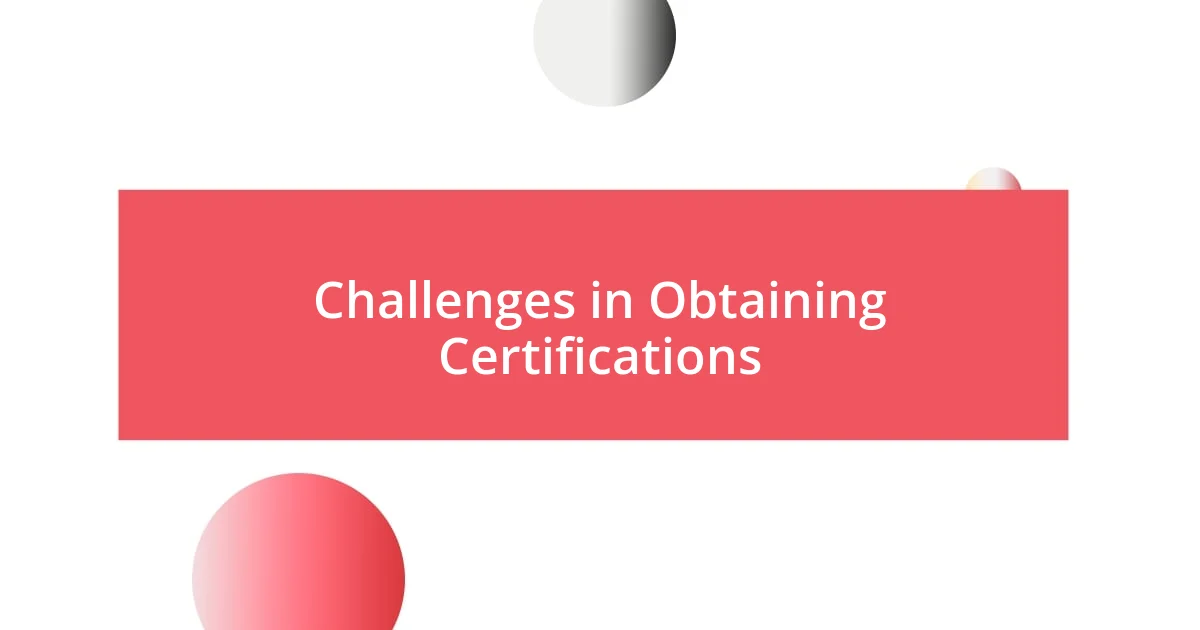
Challenges in Obtaining Certifications
Obtaining environmental certifications can often feel like navigating a labyrinth. I remember when my favorite local café wanted to go for a green certification. They had to sift through a mountain of paperwork and compliance requirements, which seemed overwhelming. Isn’t it frustrating when such a sustainability commitment gets bogged down by bureaucracy? This complexity can be a significant barrier, especially for small businesses that may lack the resources to meet all the demanding criteria.
Another challenge I’ve noticed revolves around the costs associated with certification. I once spoke with a small organic farm that wanted to achieve USDA Organic certification. They shared how the financial burden of inspections and necessary adjustments in their practices was daunting. It made me wonder, is the monetary investment justified when the return might not be immediate? For many businesses, these upfront costs can deter them from pursuing certifications, even when they genuinely want to adopt sustainable practices.
Finally, the inconsistency among certification standards can confuse both consumers and businesses alike. During my search for eco-friendly products, I’ve encountered various labels, each with its own set of criteria. It left me questioning, how do I truly know what’s green and what’s just a marketing gimmick? This variability in standards can lead to skepticism, which is unfortunate because it undermines the genuine efforts of those trying to make a positive impact. It’s vital that we create more transparent and unified systems to facilitate this important process.
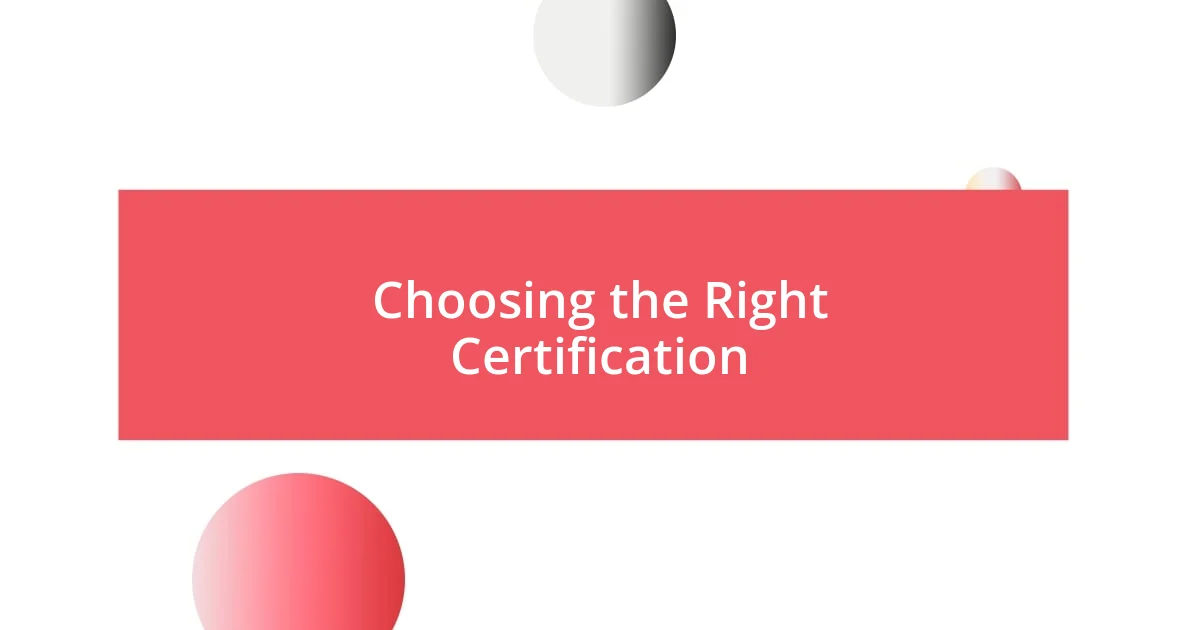
Choosing the Right Certification
When it comes to choosing the right environmental certification, understanding the specific focus of each one can be crucial. I remember feeling overwhelmed at first, staring at a list of various certifications on packaging. Each offered a different promise – from organic standards to carbon neutrality. It made me wonder, what’s the actual impact of each certification? Taking the time to research these labels can help consumers make informed choices while also enabling businesses to pursue the certification that aligns best with their mission and goals.
Reflecting on my own experiences, I found that engaging with companies seeking certification can be enlightening. I once attended a workshop where a local company shared their journey toward obtaining a fair trade certification. Hearing about their trials and successes highlighted the importance of transparency and accountability. It wasn’t just about the certification itself; it was about the commitment and responsibility that came with it. Those stories resonated with me, making it clear that the right certification is one that not only looks good on paper but also reflects genuine efforts and values.
Lastly, it’s essential to consider how these certifications resonate with your personal values. I often ask myself if a certification feels authentic or simply performative. For instance, after learning about a brand’s extensive waste reduction initiatives linked to their certification process, I felt more connected to their mission. That emotional bond can influence our purchasing decisions significantly. So, when choosing a certification, consider what aligns with your values and supports businesses that genuinely strive for sustainability. After all, what’s the point of certification if it doesn’t inspire trust and loyalty?
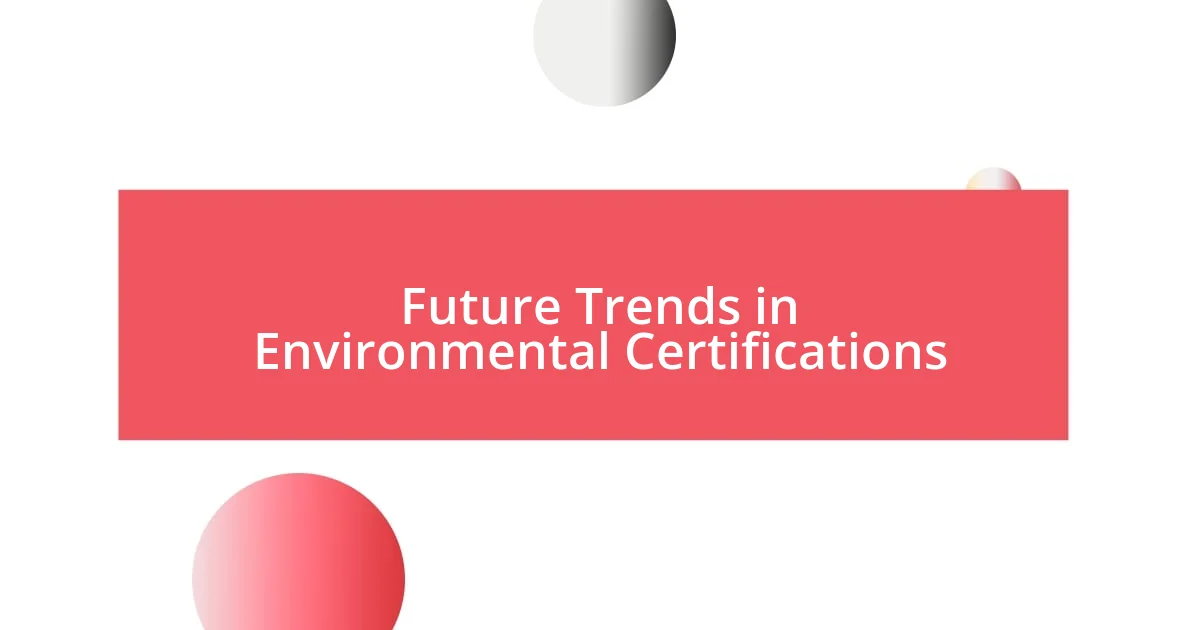
Future Trends in Environmental Certifications
The future of environmental certifications is poised for exciting evolution. I feel there’s a growing trend towards digital verification processes. I remember chatting with a friend who works at a green tech startup, and they mentioned how blockchain technology could enhance transparency in certification. Can you imagine a world where you can instantly verify a product’s claims with a simple scan? It’s not just a dream; it’s becoming a reality, and I believe this shift will empower consumers to make better choices.
Integrating social responsibility with environmental criteria is another trend I foresee gaining traction. As I reflect on recent conversations with various organizations, it’s clear that people are starting to care about the broader impact of businesses. For example, I recently discovered a company that not only prioritizes sustainability but also invests in community development. It made me think: how can we build a future where certifications reflect social justice alongside the environmental ethos? This comprehensive approach could reshape our expectations and drive more responsible business practices.
I also anticipate an increase in collaborative certifications that blend the efforts of various stakeholders. It’s reminiscent of last summer when I joined a local cleanup event that partnered with multiple organizations to promote a unified sustainability message. The camaraderie I felt among the participants got me thinking—why not have certifications that incorporate diverse criteria from numerous groups? This could create a more holistic and credible standard, helping businesses thrive while fostering a genuine commitment to the planet. Isn’t it time we explore innovative partnerships like this?


